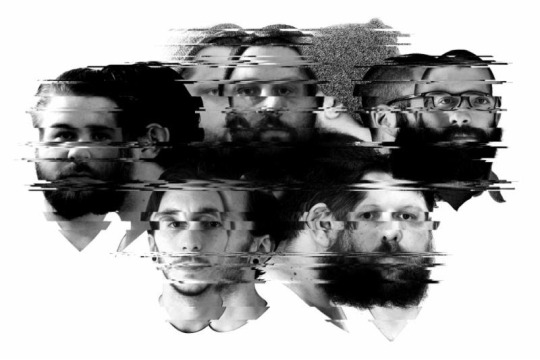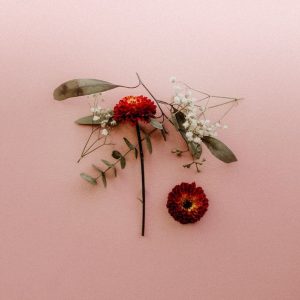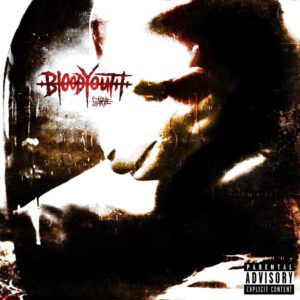Multi-instrumentalist songwriter Casey Crescenzo formed The Dear Hunter as a side-project to explore an idea for a fiction-based concept record, almost a decade ago. Today, The Dear Hunter is a full band with a catalogue of over a hundred songs to their name, the core of which is based on the evolution of Crescenzo’s original story concept, and manages to blend together an assortment of indie-rock, folk, pop and classical music.
The story, set at the turn of the twentieth century, follows the birth, life and death of a boy known as “The Dear Hunter,” and has kept fans intrigued since the release of the first ‘Act’ in 2006. Fans have waited six years for another chapter of the story after the band put the concept on hold to explore other musical projects, including 2011’s thirty-six track opus ‘The Colour Spectrum’ and 2013’s ‘Migrant.’
With only a few days to go before the release of the fourth instalment ‘Act IV: Rebirth in Reprise’, the band embarked on a long-awaited first UK headlining tour. We were at the first show in Nottingham to witness the epic concept come to life on stage and took the opportunity to talk to Crescenzo about the upcoming album as well as The Dear Hunter’s previous work to date.
AH: It’s great to be able to finally welcome you to the UK on the first night of the tour!
Casey: Thank you. We’ve waited a decade for this. We did a show supporting Manchester Orchestra in Brighton last night, now this is the first date of the headliner.
AH: How was that experience supporting Manchester Orchestra?
Casey: It was fun. They’re really good friends. Like tonight, [Brighton] was our first time being in any of the places that we’re going, so it’s a lot of fun. The only tough thing is waiting so long to get somewhere and playing for only half an hour. Even tonight, the schedule says we should play for an hour and we don’t want to piss any promoters off or anything so we’re just doing what we’re told, but it’s tough because we’ve been waiting so long to be here. How can we possibly convey in half an hour what we’re all about? We’re a different band every night depending on what our set list is. But that’s a meaningless complaint, that’s just 1% of it, the rest is just lethal, joyous, awesomeness!
AH: Well in that case, we’ll just have to get you straight back
Casey: Oh I hope so. Actually, just yesterday I wrote to my manager, who’s also my booking agent in the US and just told him “hey I want to come back”. Just as soon as it’s plausible in the sense that promoters aren’t going to say it’s too soon since we just played. I’m hoping in the spring. That’ll be far enough into the cycle of the record that we’ll have done our US touring and people will be used to it.
AH: How hard is it to write a setlist for this tour, given the size of your back catalogue now and the fact that you only have an hour to play?
Casey: It’s impossible. Especially now, we’re dancing the line between wanting to promote a new record but also wanting to promote anything that hasn’t already been promoted in this format. It’s very hard. There’s only one or two songs that the rest of the band can agree on, then the rest of it is just like, fine whatever! Whoever can come up with a good argument. But it’s very hard, I mean we have like a hundred songs!
AH: And you’re about to add more to the catalogue with the new record next week. What can we expect from the new album?
Casey: It’s not a step backwards musically, but it has more in common with ‘Acts I’, ‘II’ and ‘III’ than ‘The Colour Spectrum ‘or ‘Migrant,’ but then there’s more on ‘Act IV’ that’s in common with ‘The Colour Spectrum’ and ‘Migrant’ than ‘Act I’, ‘II’ and ‘III’, just out of nature. Where ‘The Colour Spectrum’ and ‘Migrant’ were big side-steps sonically and thematically, this is like everything put together and I feel like it’s another natural evolution of the band. It includes a lot more of the identifiable sounds like ‘Acts I’ to ‘III’ and motifs and things like that. There’s a lot of orchestra on it and that was wonderful to record. There’s one song that’s a straight up disco song, that makes sense the context of the record but when we played it people they were like “what are you doing here?” It’s really all over the place. You’ve got the songs we’ve released so far like ‘A Night on the Town,’ ‘Waves and Wait,’ and then there’s a folk-type song, but different folk – not a ‘Black Sandy Beaches’ from ‘Act II’ but also not like a ‘Go Get Your Gun’ from ‘Act III.’ Honestly, it’s all over! True to our sound it’s very eclectic and indicative of all the different things we’ve done.
AH: Given that you haven’t released an Act for 6 years, did you have to get yourself back into character to write this album?
Casey: Yeah, for sure. There’s a writer that I’m working with now and he writes the scripts for the graphic novels that I’m working on. So I’ve prepped him up to this point on the entire story and as I sat down to write ‘Act IV,’ I sat down with him as a sounding board. I was like, “now that I’m at this point, here’s all the detail on ‘Act IV,’ what do you think?” So together we fashioned up a treatment and the character details and all that stuff and I had an artist do concept artwork for no other reason than to share it with the other members of the band so that we could all get on the same page. The really exciting thing was that all the members of the band really got into it. They really took it and understood it, made meaningful additions to it and would raise red flags like “I know you want to do this here, but maybe it would make more sense here.” I love nerding out on it; I love going back and thinking what I’m wanting to do, where I’m supposed to take this, what did this guy do before he gets here, who are these people and how did they get here… So it took a lot of sitting and thinking but mostly it’s the cliche of riding a bike. It had been a while since I did it but once i got into it, it immediately felt like it was six years ago. Especially with my band now being a bigger part of it, when we got into it, there was a lot less hitting of walls, because they would always help break down any writer’s block.
AH: Is this the first time the rest of band has been involved in the writing process?
Casey: To this level, for sure. In the past I’d bring a song and show people their parts and we’d work it out and they would have a little tweak here and there. This is first time that I showed skeletons of songs and progressions of parts and they’d bounce them around and they’d come back to me and I’d shape it a little more. That’s because everyone was so authentically involved, they wanted to make it good. They didn’t just want to have their stamp on it, they didn’t care about that. Even if they weren’t playing on it, like there’s a few songs where Rob, who plays a lot of guitar, just plays organ because when we finished shaping it he was like “there’s no need for a third guitar here.” Yet he shaped the song a lot. So everyone was really selfless and that was a huge thing for us.
AH: Bands like Coheed & Cambria have embellished their concept albums with other forms of media. You mentioned graphic novels, are there any other forms that interest you?
Casey: Graphic novels are as far as it’s gone so far. I do videos myself; I did the lyric video for ‘A Night on the Town’ and I did ‘The Church and The Dime.’ All the lyric videos for ‘The Colour Spectrum’ I did myself and I’m finishing a lyric video at the moment for ‘Waves,’ but I’d really love to have an indie filmmaker take a part of the story and make a version of it. But I don’t know yet!
AH: Looking back on some of your previous work, how was the experience of playing the entire ‘Colour Spectrum’ in one show?
Casey: It was a marathon! It was definitely something where we said “hey let’s do this” without really thinking about doing it. You make these promises to yourself and then realise you have to do the things you said you’d do. By the time we came to performing it we’d been rehearsing it twice a day for two weeks, so that’s six to eight hours of rehearsing a day. But when we came to do it, like when we were three quarters through, it was like the runner’s high: “oh my god we’re actually going to pull this off!”
AH: Would you ever consider doing the same thing with the Acts when they’re all done?
Casey: I think that would be too long, it would probably be about 7 hours. I could probably split it over three nights and play Act I and II, then III and IV, V and VI, that could work.
AH: Most bands produce what I’d call “regular” albums and then maybe try their hand at a concept record. You’ve approached things completely opposite and done two big concept projects and written a ‘regular’ album, ‘Migrant,’ in between. How different was the process of making that album?
Casey: There was much less stress. Your bar for success internally is based on a very different criteria. Writing a concept record, if you do it in a way that you really care about, you have to realise that some people will fact-check it, pull it apart and dissect it. They’ll analyse the lyrics and say “this song has no place”, or “this line doesn’t mean anything,” but just writing an album, you’re doing something for yourself completely. There are no plot holes or anachronisms or anything like that, it’s just whatever you want it to be. It’s liberating, but for me it’s not the way that I write. So it was more like I had to do it to cleanse my palette then move on to something else.
AH: You challenged yourself by writing a simple album?
Casey: Yes! Honestly, it was! Writing something that wasn’t just one idea, didn’t have a plot, didn’t have characters and was just about myself, without any fiction… I would probably do it again, but I’m back to being excited about concept records.
AH: I just want to touch briefly on a non Dear Hunter project and talk about your symphony Armor and Attrition. It was a superb achievement, where did the idea for writing a symphony come from?
Casey: When we did ‘The Colour Spectrum’ show, I tried to get somebody to prepare string quartet parts for the show but they pulled out three days before, so I had to learn how to do it. I prepared twelve songs worth of string quartet parts, gave them to the quartet and they told me everything I did wrong. Then, later, I decided to prepare string quartet parts to track ‘Migrant’ and they came in and told me everything I did right, so I finally got the quartet close to good. Then after that I really fell in love with the technical side of preparing parts but also writing music, so I told my manager that I really wanted to do something more orchestral. Not a rock orchestra thing, or even me singing over it. He was like “well what do you want to do, like a song or what?” I thought about it and said “no, I want to try and do a symphony” and he was like “okay, since you have no classical training or theory training, how about we ask your fans if this is something they’d want to hear. Let’s try crowd funding and if it gets funded, fine, and if it doesn’t then you know you’ve got no place trying to do this!” But then it got funded, really quickly, and I realised I had to actually go and do it. I had about 15% done by the time it got funded and then I had a month between it being fully funded and me having to go and record it. That was another situation where I hired someone to prepare parts for the orchestra – it was an orchestra I’d never worked with and I’d never written for woodwind or brass – so I hired someone to take my music and prepared the sheet music. I’d send him my sheet music which would be dirty and he’d take that and clean it up so the orchestra could read it, then he ducked out like a week before! It was really frustrating, again, but each time this happens I end up learning how to do it and I’ve brought that experience to ‘Act IV.’
AH: Would you do another symphony?
Casey: Oh yeah. It would be very different. I really wanted to make a romantic symphony and now I would want to do something dark and more peculiar.
AH: And finally, without trying to get too far ahead before Act IV is even out, do you know what you’re likely to do next? Will you move on to Act V?
Casey: I think so. I think I would. I don’t know for sure but that’s where my head’s at. It could change, as it usually does, but right now that’s what I think would be next, yes.
‘Act VI: Rebirth in Reprise’ by The Dear Hunter is released on September 9th on Cave & Canary Goods/Equal Vision Records (US) and Rude Records (UK).
The Dear Hunter links: Website|Facebook|Twitter|Soundcloud
Words by Mark Johnson (@testwood)






